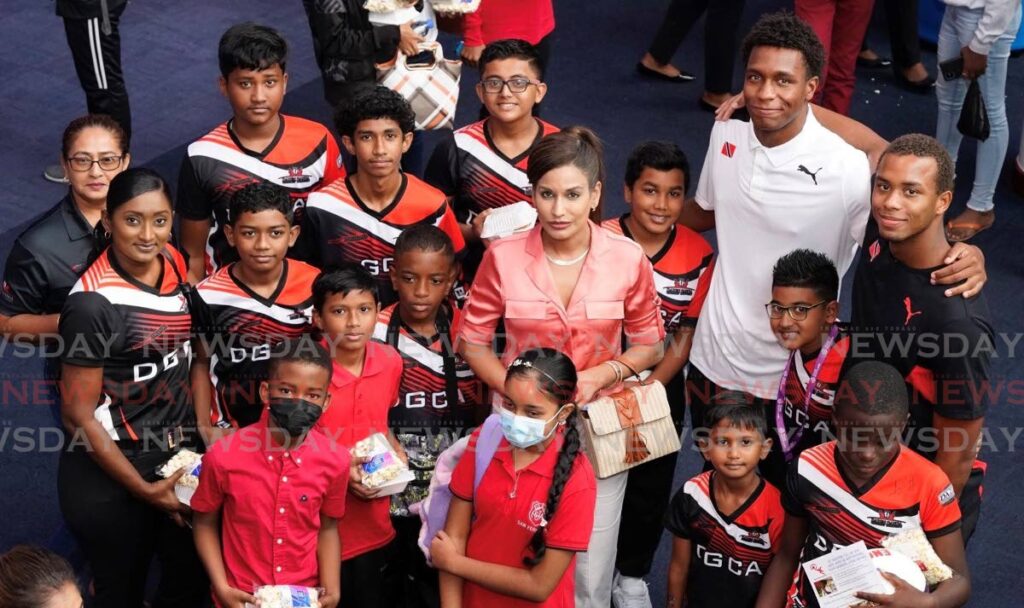Athletes get candid at sport, mental health seminar

SEVERAL local and international athletes opened up about their triumphs and struggles in both their personal lives and careers at the British High Commission's seminar on sport and mental well-being.
While many differing perspectives and experiences were shared, the athletes urged young people not to give up and to ensure they surround themselves with good people.
The seminar was held at Queen's Hall, St Ann's, on Thursday morning.
There were two panel discussions. The first featured four-time Olympian and national shotputter Cleopatra Borel, former World 400m hurdles champ Jehue Gordon, former TT Red Force captain Rayad Emrit and former gymnast Thema Williams.
Children in the audience put questions to their favourite athletes, seeking advice on life and sports.
One asked the athletes what they do to "push through all of (their) issues and mental-health (struggles)."
Gordon said athletes, especially those who compete at the elite level, go to competitions with the intention of winning.
However, he admitted, "Sometimes we place eighth, sometimes we don't make a final and obviously, we are heavily criticised.
"At the end of the day, it comes down to your support team," he advised.
He suggested having a "small circle" or group of people to trust and depend on.
Also helpful, he said, was: "just (being fuelled by) the love and passion and knowing some of the struggles you have faced that you never want to experience in life again."

- Narissa Fraser
Emrit recalled playing a match in India in 2014 during which he dislocated his shoulder. He said doctors told him he might never be able to bowl again, which negatively affected his mental health.
"Cricket was my life," he said, adding that he had not thought what his life would be without it.
But he too credited having great friends and family who supported him and helped him out of that funk, in addition to prayer.
"There's nights I went to sleep crying," he recalled.
After a lot of physical therapy, he went on to play a tournament in which he took the most wickets.
Others asked how much of the athletes' headspace sports took up. Williams said it should not be 100 per cent.
She said it can be difficult, but urged young people to try to do other things that make them happy.
Borel also advised people to be "be intentional about their happiness," and added that there is nothing wrong with realising and admitting when you are not okay.
Both she and Gordon spoke highly of psychologists and explained how working with them helped greatly.
Borel and Williams mentioned experiencing impostor syndrome and said often, they had to remind themselves that they deserved to be among the quality of athletes they competed against.
One particular question from a ten-year-old stunned the panel: How do you become a great sportsman?
This was put to Gordon, who reminded the audience: "Everybody's story is going to be a bit different.
"Know what sport you love, why you love doing it and have reasons to continue going."
He added, "If it's because of all the shiny things that go on, then I don't think you may last as long as you want to."
Emrit also suggested that athletes should not focus on overly harsh criticisms of them online, as that could break one's focus.
There was a heartwarming moment when a big fan of Borel had his question put to her: What fruits and vegetables do you eat to keep throwing that big weighted ball?
She later brought him on stage and they shared a hug.
In a later panel, athletes competing at the Commonwealth Youth Games from Anguilla, England and Scotland, as well as TT swimmer Nikoli Blackman, answered questions.
British High Commissioner to TT Harriet Cross said the session was held because sport has "a profound impact on mental well-being" and hoped those who attended left inspired.
Deputy permanent secretary in the Sport Ministry David Roberts said acknowledging one's struggles is an act of courage and urged those present to persevere.


Comments
"Athletes get candid at sport, mental health seminar"